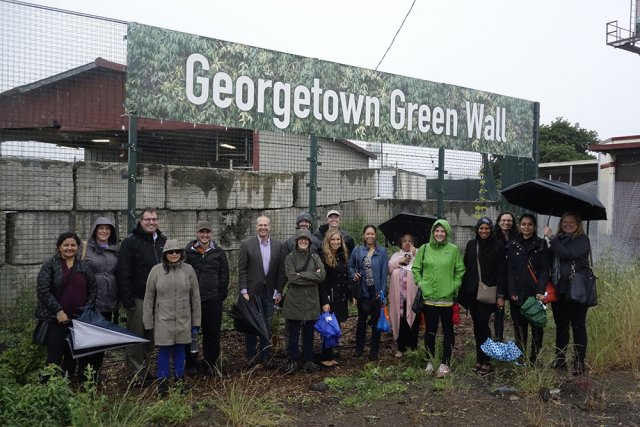Seattle Community-Port Collaboration Pilot Project
- Community-Port
Collaboration Pilot Projects - New Orleans
Pilot Project - Providence
Pilot Project - Savannah
Pilot Project - Seattle
Pilot Project
In 2016, EPA selected the Port of Seattle, its near-port neighbors in the Duwamish Valley and a local health equity non-profit (Just Health Action) to receive EPA technical assistance and pilot a draft Community-Port Collaboration Toolkit. This pilot project was one of four pilots that were collectively known as the Near-Port Community Capacity Building Project. The Duwamish Valley community, consisting of Seattle’s Georgetown and South Park neighborhoods, is characterized as an area with disproportionate health impacts and environmental injustices where more effective actions and investments are needed to address health and economic inequities. The Port of Seattle's (Port) 2011 Century Agenda commits the Port to create opportunity for all, be a responsible environmental steward, partner with surrounding communities, promote social responsibility, and conduct itself transparently and with accountability. This page provides an overview of the pilot project. For more information, go to Case Study: Seattle Pilot (pdf) (284 KB, July 2020, EPA-420-F-20-025).
Technical Assistance

In June 2017, EPA convened a two-day series of site visits and needs assessment meetings to determine the type of technical assistance both the Port and community desired. The site visits and needs assessment included the following:
- A Bus tour of the Port and a walking tour of the of both Georgetown and South Park neighborhoods;
- A facilitated discussion between Port and community representatives about the purpose and goals of the pilot, an overview of the challenges confronting the community, past and current engagement with the Port, as well as the identification of near, medium and long-term priorities for the project.
Through subsequent dialogues and training workshops, community partners formed the Port Community Action Team (PCAT) and used the following technical assistance training resources:
- Community Benefits Agreement (CBA);
- Collaborative Problem-Solving and Storytelling; and
- Ports and Equitable Development.
Outcomes
There were several successful outcomes from the Seattle Pilot including the following.
- Stimulated the development of a Duwamish Valley PCAT that elevates the voices of community members in Port matters and empowered Port staff to use PCAT feedback;
- Launched a contract in which PCAT members serve as community-based consultants and are compensated for contributing their expertise to the project;
- Accomplished mutually beneficial near-term action projects together;
- PCAT provided training and consultation to Port staff on cultural competency and inclusive engagement practices;
- Port Commission adopted a motion authorizing the creation of the Duwamish Valley Community Equity Program (DVCEP); and
- Port staff and the PCAT collaborated to co-write and adopt Resolution 3767, the Duwamish Valley Community Benefits Commitment, a policy directive that guides the implementation of the DVCEP and other Port operations that impact the Duwamish Valley community.
Lessons Learned
The pilot project resulted in the following set of insights that could help other port and near-port community collaborations:
- Valuing community expertise as project assets set the tone for equitable engagement;
- The role of senior port leadership and their buy-in was crucial to success;
- Establishing relationships within a “core team” of leaders can help overcome “bumps in the road”;
- Equitable development training for port staff can facilitate new understandings; and
- Commitment to implementation at the outset is key.
